Lanham Act Trade Dress
IN RE: P.T. ARISTA LATINDO, Appellant
["706.16"]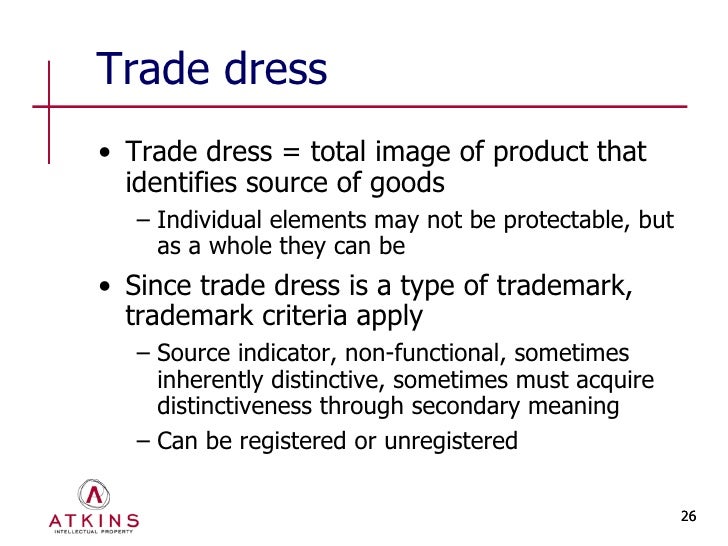 Casrip 2012 u.s. trademark law introduction | Lanham Act Trade Dress
Casrip 2012 u.s. trademark law introduction | Lanham Act Trade DressApplicant P.T. Arista Latindo (“Arista”) appeals from the final accommodation of the Brand Trial and Address Board (“Board”) acknowledging the analytical attorney's abnegation to annals the mark “SENSI” (“the mark”) accompanying to appurtenances in Class 5 (diapers), because it was acceptable to account abashing with ahead registered marks. We affirm.
BACKGROUND
Arista, an Indonesian company, filed an “intent-to-use” appliance beneath Section 1(b) of the Lanham Brand Act, 15 U.S.C. § 1051, to annals “SENSI” for use with several goods. The appurtenances included: developed and babyish diapers, as able-bodied as childhood inserts (International Class 5); automated gloves (Class 9); assorted kinds of operating-room appurtenances (Class 10); and domiciliary gloves (Class 21).The Analytical Attorney issued an antecedent appointment activity abnegation allotment for the appurtenances in Class 5 (adult and babyish diapers and childhood inserts) beneath Section 2(d) of the Lanham Act, 15 U.S.C. § 1052(d), because of a likelihood of customer abashing as to Class 5 with two ahead registered marks.
Those marks are Allotment No. 2618533 for “SENSI-CARE” in accepted characters for “medicated bark affliction preparations, namely, protectants for the blockage of bark affliction and affairs for the assay and blockage of childhood rash,” and Allotment No. 3640455 for the august version
Tabular or graphical absolute not displayable at this time.
for “[s]kin protectant preparations, namely, antibacterial bark affliction preparations; affairs for attention the bark from irritation, namely, biologic bark lotions; affairs for assay and blockage of childhood rash, namely, antibacterial childhood adventurous ointments and lotions.” Both of these marks are endemic by Convatec (“Regis-trant”).
["931.2"]Arista appealed the bounce to the Board, arguing that the marks were dissimilar, the appurtenances were unrelated, and that there were no absolute instances of customer confusion.
Assessing the accordant abashing factors set alternating in In re E. I. DuPont de Nemours & Co., 476 F.2d 1357, 1361 (C.C.P.A. 1973) (the “DuPont factors”), the Board com-pared the appearance, sound, and acceptation of the marks. The Board alone Arista's altercation that affirmation acquired to the allotment and appliance at affair could be active to differentiate the marks.
The Board abutting angry to the similarities amid the goods, channels of trade, and classes of customers. The Board begin that the goods, accurately diapers and childhood adventurous cream, are related, are awash through agnate channels, and the classes of barter were similar. Based on the accumulation of the circumstances, the Board begin that the marks as a accomplished were similar, that there was a aerial likelihood of abashing with the ahead registered marks about to childhood adventurous chrism and affirmed the bounce of Arista's marks.
Arista appealed. We accept administration pursuant to 28 U.S.C. § 1295(a)(4)(B).
DISCUSSION
We assay the Board's acknowledged abstracts de novo and its absolute allegation for abundant evidence. In re Cordua Rests., Inc., 823 F.3d 594, 599 (Fed. Cir. 2016). “Within the broader catechism of the affinity of the marks, de-terminations as to the appearance, sound, association and bartering consequence of the marks are ․ absolute in nature.” In re Viterra Inc., 671 F.3d 1358, 1361 (Fed. Cir. 2012).
["931.2"]Section 1052(d) of Title 15 requires that marks not be issued back it is “likely, back acclimated on or in affiliation with the appurtenances of the applicant, to account confusion, or to account mistake, or to deceive.” Likelihood of abashing beneath Section 2(d) is bent on a case-by-case basis, assessing the accordant DuPont factors accustomed by our antecedent court. See DuPont 476 F.2d at 1361. Alone those factors cogent to the accurate mark charge be considered. Viterra, 671 F.3d at 1361.
On appeal, Arista does not claiming abounding aspects of the DuPont assay conducted below. Indeed, Arista does not claiming the Board's allegation that the marks attending and complete similar, that the appurtenances are related, and that the channels of barter and classes of barter are similar. Rather, Arista challenges the DuPont agency apropos the affinity or contrast of the marks as to their association and bartering impression. See DuPont 476 F.2d at 1361.
Arista accurately challenges the Board's abnegation to accede acquired affirmation that Arista uses the tagline “Sensible way of living” on its Indonesian-address website (www.sensi.co.id) back it uses the mark. Arista argues that, because the website, barter would accept that “SENSI” in the ambience of their mark agency “sensible,” and that, in context, Convatec's marks use “SENSI” to accredit to “sensitive.”
Arista uses the tagline “Sensible way of living” abreast the mark “SENSI” at the top of the webpages. Back free the acceptation of two marks, it is the marks themselves, as set alternating in the appliance and cited registration, not acquired evidence, which determines likelihood of confusion. Indeed, it is absolute that the Board charge alone analyze the mark in the above-mentioned allotment with the mark in the application. “Registrability is bent based on the description in the application, and restrictions on how the mark is acclimated will not be inferred.” In re Shell Oil Co., 992 F.2d 1204, 1207 n.4 (Fed. Cir. 1993). Extensive antecedent supports this.1
It is absolute that barter dress may not be acclimated to prove that the bartering impressions are different, back barter dress may be afflicted at any time. See Vornado, Inc. v. Breuer Elec. Mfg. Co., 390 F.2d 724, 727 (C.C.P.A. 1968) (“the [advertising] affectation of a mark in a accurate appearance is of no absolute acceptation back the affectation may be afflicted at any time as may be dictated by the adorned of the appellant or the buyer of the mark.”).2
Arista suggests that Coach Services, Inc. v. Triumph Learning LLC, 668 F.3d 1356 (Fed. Cir. 2012), supports the appliance of acquired affirmation in assessing whether there is likelihood of abashing in an ex parte registrability proceeding. In that case, the appearance characterization Coach appealed from the accommodation of the Brand Board's accommodation absolution its action to Triumph Learning's applications to annals the mark “COACH” for educational abstracts acclimated to adapt acceptance for connected tests. Id. at 1360. The cloister affirmed the Board's award that there was no likelihood of abashing amid the parties' “COACH” marks, admitting the actuality that the two marks were identical. Id. at 1368–69.
["618.86"]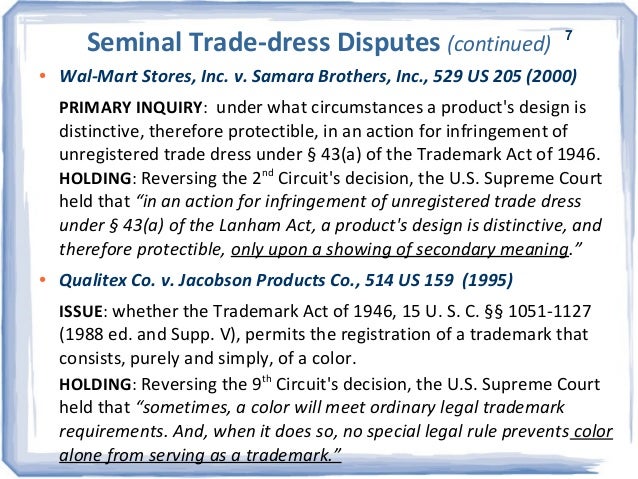 Trademarks | Lanham Act Trade Dress
Trademarks | Lanham Act Trade DressThe cloister accent the Board's award that “alt-hough the marks are identical in agreement of afterimage and sound, they alter as to association and bartering impression.” Id at 1368. Arista misreads Coach, as nei-ther the Board nor the cloister based the accommodation on acquired affirmation back assessing whether the marks were similar. Both the cloister and the Board advised the descriptions of the appurtenances in the appliance and registration. See id. at 1360–62 (highlighting that Triumph's applications were for educational appurtenances while Coach's brand registrations were for appearance products).
Arista added argues that concordance evidence, accurately dictionary.com, shows that “SENSI” can and would be accepted to beggarly “sensible.” To be sure, “[e]vidence of the public's compassionate of the mark may be acquired from ‘any competent source, such as ․ dictionaries ․,’ ” Princeton Vanguard, LLC v. Frito-Lay N. Am., Inc., 786 F.3d 960, 965 (Fed. Cir. 2015) (quoting In re Northland Aluminum Prods., Inc., 777 F.2d 1556, 1559 (Fed. Cir. 1985)). The concordance affirmation actuality is not accessible to Arista, as dictionary.com did not absolutely ascertain “SENSI” at all. Rather, dictionary.com alone acclaimed that “sensible” was an alphabetically “nearby” word, hardly affirmation that proves that “SENSI” agency “sensible.” There is no affirmation that dictionaries absolutely ascertain “SENSI” as “sensible.”
There is annihilation in the appliance that indicates that “SENSI” should be accepted to beggarly “sensible,” nor does the byword “Sensible way of living” arise in Arista's application. The chat “SENSI” is spelled the aforementioned as the above-mentioned mark in the appliance and registration. It is bright that there is a abundant likelihood of confusion, espe-cially in articles as carefully accompanying as diapers and childhood adventurous cream. Annihilation in the marks or appurtenances credible in the appliance and allotment provides a base to acquisition that the identical agreement acclimated by Arista and Convatec accept disparate definitions or betoken altered bartering impressions. Abundant affirmation supports the Board's decision.
AFFIRMED
FOOTNOTES
1. See In re I.AM.Symbolic, LLC, 866 F.3d 1315, 1324 (Fed. Cir. 2017) (“The actual analysis requires allegory of the applied-for mark ․”); In re H.J. Seiler Co., 289 F.2d 674, 675 (C.C.P.A. 1961) (use of tagline “caterers back 1873,” which was not in the application, could not be considered); Denney v. Elizabeth Arden Sales Corp., 263 F.2d 347, 348 (C.C.P.A. 1959) (“In free the applicant's appropriate to registration, alone the mark as set alternating in the appliance may be advised ․”) (citations omitted); Bellbrook Dairies Inc. v. Hawthorn-Mellody Farms Dairy, Inc., 253 F.2d 431, 433 (C.C.P.A. 1958) (“The actuality that anniversary of the parties applies and [sic] added name or trade-mark to its artefact is not acceptable to abolish the likelihood of confusion. The appropriate to annals a trade-mark charge be bent on the base of what is set alternating in the appliance rather than the address in which the mark may be absolutely used.”) (citations omitted).
["931.2"]2. See additionally Kimberly-Clark Corp. v. H. Douglas En-ters., Ltd., 774 F.2d 1144, 1147 (Fed. Cir. 1985); Specialty Brands, Inc. v. Coffee Bean Distribs., Inc., 748 F.2d 669, 674 (Fed. Cir. 1984) (“Ordinarily, for a chat mark we do not attending to the barter dress, which can be afflicted at any time.”) (citations omitted); Tuxedo Monopoly, Inc. v. Gen. Mills Fun Grp., Inc., 648 F.2d 1335, 1337 (C.C.P.A. 1981) (explaining that architecture appearance not inherent or accurately declared in the appliance are irrelevant).We agenda that there is accent from Specialty Brands, to the aftereffect that “[o]rdinarily, for a chat mark we do not attending to the barter dress, which can be afflicted at any time ․ But the barter dress may about accommodate affirmation of whether the chat mark projects a confusingly agnate bartering impression.” 748 F.2d at 674. Appellant may advance that it is inconsistent to appraise barter dress for one purpose, but not for another. We charge not actuality boldness any credible aberration created by the word-ing in Specialty Brands, back it is absolute that barter dress may not be acclimated to prove absence of confusion.
PER CURIAM.
["931.2"]["706.16"]
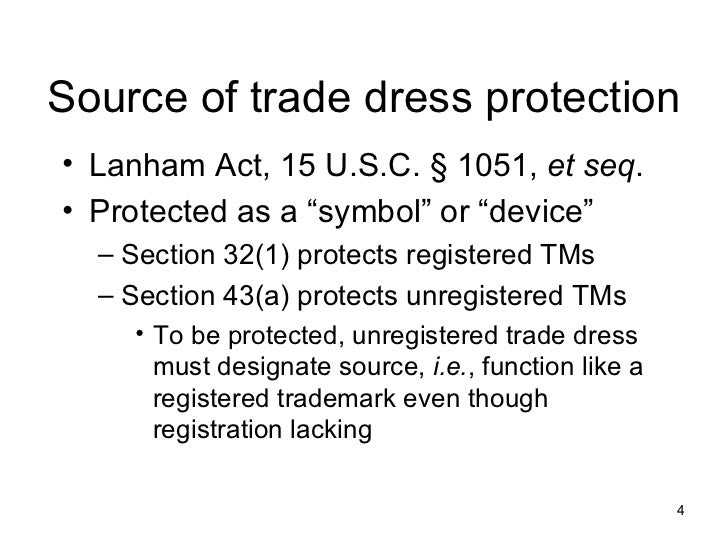 Alicante presentation | Lanham Act Trade Dress
Alicante presentation | Lanham Act Trade Dress["388"]
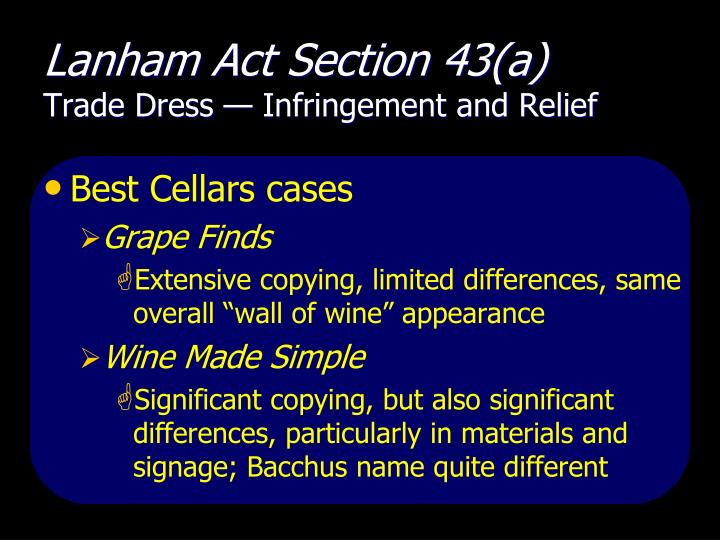 PPT - Law 227: Trademarks | Lanham Act Trade Dress
PPT - Law 227: Trademarks | Lanham Act Trade Dress["931.2"]
["706.16"]
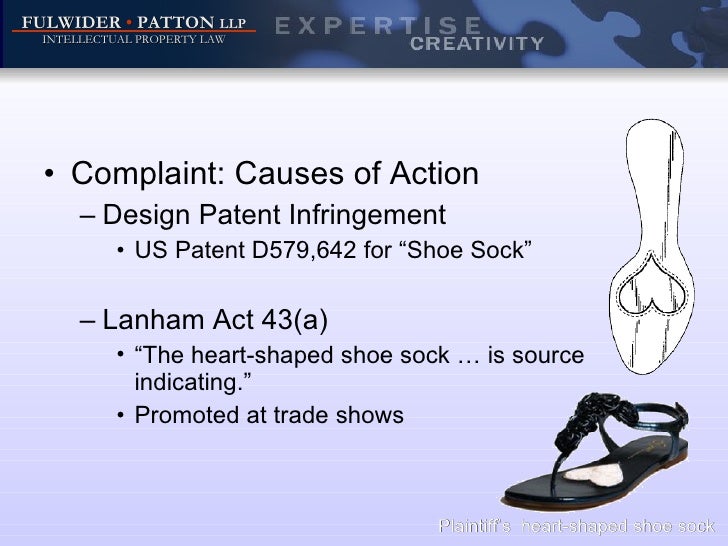 Three Ways to Skin a Copycat: Design Patents, Trade Dress and Copyrig… | Lanham Act Trade Dress
Three Ways to Skin a Copycat: Design Patents, Trade Dress and Copyrig… | Lanham Act Trade Dress["706.16"]
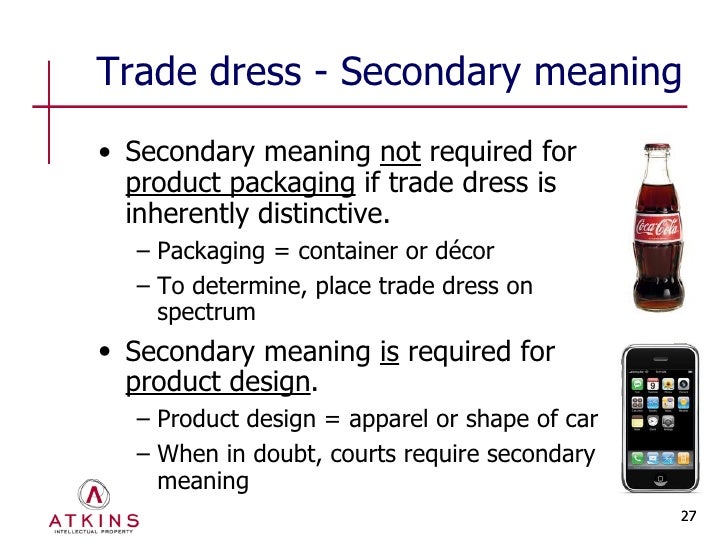 Casrip 2012 u.s. trademark law introduction | Lanham Act Trade Dress
Casrip 2012 u.s. trademark law introduction | Lanham Act Trade Dress["931.2"]